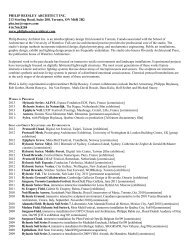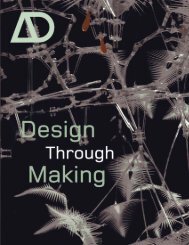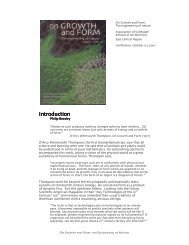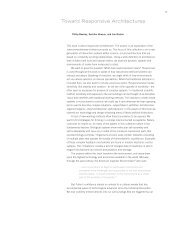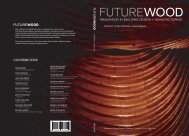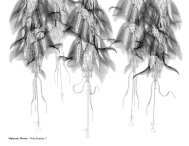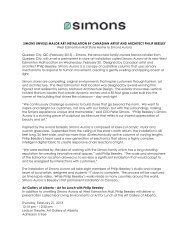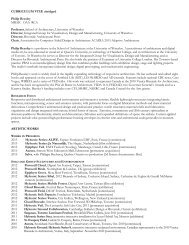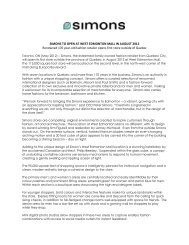Mobile Nation - Philip Beesley
Mobile Nation - Philip Beesley
Mobile Nation - Philip Beesley
Create successful ePaper yourself
Turn your PDF publications into a flip-book with our unique Google optimized e-Paper software.
11 K. Cohen,<br />
‘Translation: Sociology:<br />
Design’ (paper presented<br />
as a visiting lecturer to the<br />
Oxford Internet Institute,<br />
Oxford, UK, 2003);<br />
K. Cohen, ‘Applying<br />
Collaboration Theory to<br />
Social Spaces’ (presented<br />
at BRIDGES Conference<br />
II, Banff Centre for the Arts,<br />
Banff, AB, October 4–6,<br />
2002).<br />
nects research, arts, and industry focused on mobile, wireless, and digital<br />
technologies in Canada. The network facilitates research and innovative<br />
industry development; fosters cultural production and public participation;<br />
and develops forward-thinking policy on wireless technologies. This<br />
project has seen the creation of numerous exciting prototypes for new<br />
forms of content and experiences that occur in urban and national parks,<br />
using mobile devices as a key component. The <strong>Mobile</strong> <strong>Nation</strong> conference<br />
was an opportunity for participants to explore experiences that included<br />
annotated and illustrated walking tours, historical ghost stories, privateto-public<br />
ephemeral graffiti, and collaborative sound games.<br />
This conference provided an opportunity to disseminate the MDCN’s<br />
collective efforts in the creation of the MEE, a technology that will greatly<br />
assist in future design of mobile games for cellphones. Developers can<br />
benefit from the knowledge that our research teams gained. MEE has been<br />
created to radically simplify the process of creating and managing mediarich,<br />
interactive mobile applications, and in particular location-based applications<br />
using GPS and peer-to-peer applications such as Bluetooth. By<br />
removing most of the engineering from the design cycle and enabling designers<br />
to create complex applications using simple XML language, MEE makes<br />
rapid prototyping a reality for mobile applications and takes mobile application<br />
product development into new domains. At the <strong>Mobile</strong> <strong>Nation</strong><br />
conference, the MEE was introduced to the community, and developers<br />
and designers had the opportunity to create their own mobile applications.<br />
By applying humanities and social science knowledge and methods<br />
to the analysis of the emerging mobile content and platform worlds, we<br />
can innovatively engage design theory, communications studies, social<br />
geography, cultural studies, and ethnographic research methodologies.<br />
In bringing experts and scholars together, <strong>Mobile</strong> <strong>Nation</strong> enables more<br />
comprehensive, effective, and integrated research and inquiry. 11<br />
The Canadian Design Research Network (CDRN), a <strong>Nation</strong>al Centre<br />
of Excellence for the dissemination of and training in design research,<br />
was a partner in the creation of the <strong>Mobile</strong> <strong>Nation</strong> conference and publications.<br />
The CDRN presented an interactive sensor and technology workshop,<br />
a special poster and symposia events for students, industry panels,<br />
and outreach to communities that can make use of the discoveries at the<br />
confe-rence through <strong>Mobile</strong> <strong>Nation</strong> publications.<br />
The conference subtext, ‘creating methodologies for mobile platforms,’<br />
intentionally uses the term ‘creating’ as a double entendre. <strong>Mobile</strong> research<br />
methods must allow collaborative ‘creating’ on the part of designers,<br />
engineers, and users. At the same time, mobile research requires the ‘creating’<br />
of unique, cross-disciplinary methodologies and tools that will enable<br />
all manner of new innovation in the field. We hope that you find this<br />
collection of essays connected to the <strong>Mobile</strong> <strong>Nation</strong> conference to be<br />
useful and stimulating.<br />
<strong>Mobile</strong> <strong>Nation</strong><br />
key themes and key thinkers<br />
Martha Ladly<br />
Ontario College of Art & Design<br />
The key themes for <strong>Mobile</strong> <strong>Nation</strong> are:<br />
1. Participatory culture, design, and ethnography<br />
2. Creating for the multi-platform context<br />
3. Pervasive and social computing<br />
4. <strong>Mobile</strong> communication and education<br />
5. Engineering meets humanities and social science<br />
<strong>Mobile</strong> <strong>Nation</strong> chose our key-theme thinkers because their insights would<br />
allow readers and participants to bridge practice and theory. They are all<br />
eminent scholars or practitioners who share insatiable curiosity and an<br />
ability to think across disciplinary, cultural, or technological boundaries.<br />
Our choice of a geographer, a sociologist, a communication scholar, a<br />
leading analyst and creator of social media, and a filmmaker and ethnographer<br />
who is also an entrepreneur suggests the complexity of the field of<br />
mobile media. It acknowledges the need to approach research and innovation<br />
in this field from very different perspectives. We believe that our<br />
thinkers provide direction on difficult questions in ways that are clear<br />
and understandable. At the same time, they pose new, sometimes unconventional,<br />
questions and suggest new directions for creative, technical,<br />
and business practice as well as scholarship.<br />
The <strong>Mobile</strong> <strong>Nation</strong> key-theme thinkers share an impressive range of<br />
experience and expertise: Marc Davis, a social media theorist and garage<br />
cinema researcher, focused on creating the technology and applications<br />
at Yahoo! Research Berkeley that will enable daily media consumers to<br />
become daily media producers; James E. Katz, a communication scholar<br />
and expert on mobile media, is chair of the Department of Communication<br />
at Rutgers University, where he also directs the Center for <strong>Mobile</strong><br />
Communication Studies; Nigel Thrift, a professor emeritus, fellow of<br />
the British Academy, and leading theorist of social geography, is the vicechancellor<br />
of the University of Warwick; Nina Wakeford, a sociologist,<br />
is director of the Incubator for Critical Inquiry into Technology and<br />
Ethnography (INCITE) and reader in sociology and social methodology<br />
at Goldsmiths College, University of London; and Parmesh Shahani, a<br />
contemporary ethnographer, author, and innovator, is director of the<br />
Mahindra Incubation Laboratories, Mumbai, and gave the North American<br />
premiere of his film Ctrl Alt Del at <strong>Mobile</strong> <strong>Nation</strong>. You will discover that<br />
their essays and insights move us more deeply into the mobile context.<br />
5 INTRODUCTION<br />
MOBILE NATION<br />
6



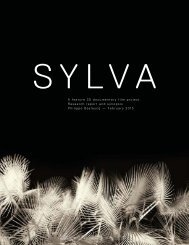
![Digital Architecture Now - Neil Spiller [Publication] - Philip Beesley](https://img.yumpu.com/51382552/1/190x214/digital-architecture-now-neil-spiller-publication-philip-beesley.jpg?quality=85)
